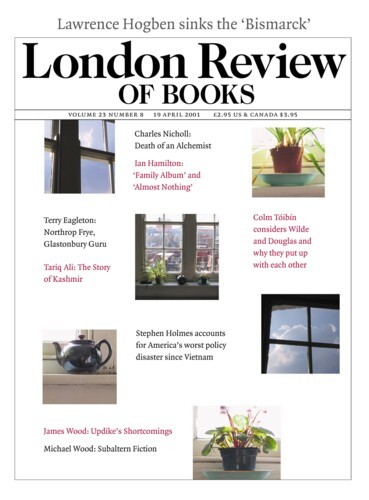Martin Amis’s memoir, Experience, was recently published in paperback. The banned ads have returned to the Underground, now that the offending image of the boy Amis ‘smoking’ in short trousers – never mind that the cigarette was unlit – has been overlaid by a minimalist design of red and white text stamped on a wash of black, intimating No Logo chic. In the introductory chapter, in one of those famous footnotes, Amis remarks that ‘actually there’s a good reason, a structural reason, why novelists should excite corrosiveness in the press’: namely, ‘when you write about a novelist, an exponent of prose narrative, then you write a prose narrative. And was that the extent of your hopes for your prose – bookchat, interviews, gossip? Valued reader, it is not for me to say this is envy. It is for you to say that this is envy.’ Gautier expressed the sentiment more gracefully, and not just because he did so in French: ‘Avis aux critiques. C’est un grand avantage de n’avoir rien fait, mais il ne faut pas en abuser.’ The only, feeble reply to which is: ‘What would you know, achiever?’
Anyway, whether or not he had greater hopes for his own works of envy at the time he wrote them, they’ve now been gathered in a handsome volume called The War against Cliché: Essays and Reviews 1971-2000 (it’s not due for another week or so, but, with the appearance of the foreword in the Guardian the other weekend, all of it, bar the footnotes, has now been previously published). The war metaphor might not strike the patronised reader as the least hackneyed conceit ever, but last year, at any rate, Amis announced a temporary ceasefire after three decades of strife. Writing in Experience about a lull between visits to the dentist, he says: ‘all that weekend I was, as the saying has it, a model of calm. That cliché is actually very telling and descriptive (like many other clichés: “beside yourself”, for instance).’ Publishing a book with this title within a year of writing those sentences sounds like a classic case of the author having his cake and eating it, and though a tempting defence against such a charge is to quote Whitman and his inner multitudes, unfortunately that’s a cliché these days, too.
A more helpful way to think about cliché may be not as a category but a condition, not something that a phrase is but the way in which metaphor decays (and the brighter they burn, the faster they fade: temporary, like Achilles). Once upon a time, someone said ‘the brighter they burn, the faster they fade’ when no one else had ever said it before – just imagine.
The opening campaign in Amis’s war (I hope that’s not overstretching the conceit: I mean the first part of his book) is ‘On Masculinity and Related Questions’. A piece on Peter Murphy’s new book, Studs, Tools and the Family Jewels: Metaphors Men Live By (Wisconsin, $19.95) would have fitted in there nicely, bearing as it does on the cliché question, too. Amis is, alas, unlikely ever to write about it, but if he did, perhaps the piece could lead the charge in the next volume of essays, 2001-2030, tentatively entitled ‘The Cliché Strikes Back’.
The blurb on War says that Amis is, ‘like John Updike’, ‘the pre-eminent novelist-critic of his generation’ (there isn’t, curiously, a reciprocal comparison with Amis on the jacket of Updike’s More Matter). That being so, wouldn’t the best way for a stylist as expert as Amis to do battle against the forces of shoddy prose be to get on with producing more of the fresh stuff himself, rather than reprinting 1000-word novel reviews that appeared in the New Statesman in 1973? But maybe I’m only saying so because Short Cuts: An Anthology won’t be appearing in bookshops anytime soon. Valued reader, it is not for me to say this is envy; that’s just what Martin Amis says.
Send Letters To:
The Editor
London Review of Books,
28 Little Russell Street
London, WC1A 2HN
letters@lrb.co.uk
Please include name, address, and a telephone number.

